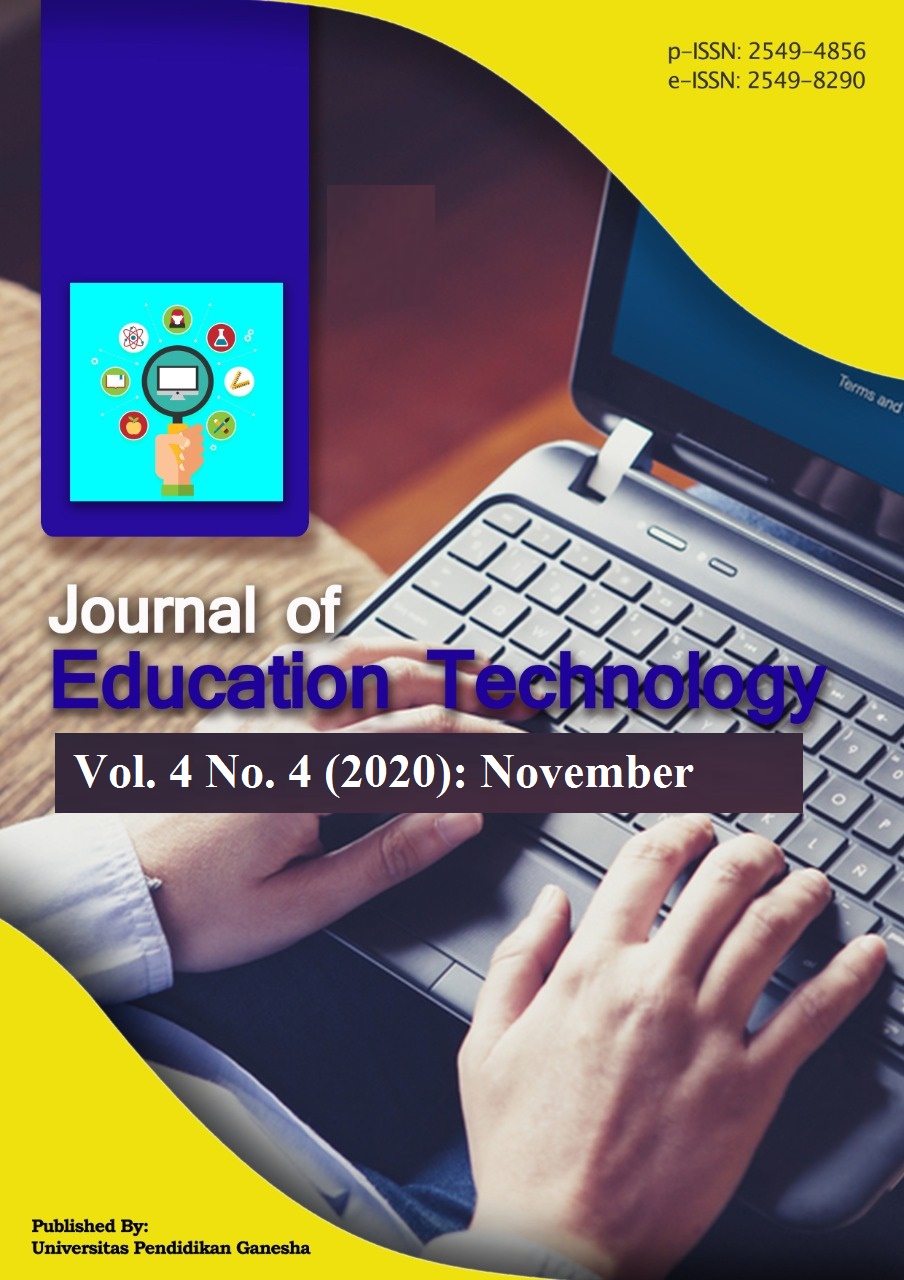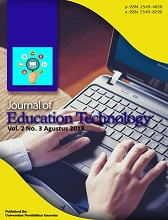Design and Implementation of Online Problem Based Learning (PBL) Assisted by Innovative Media to Improve Elementary School Student Learning Outcomes
DOI:
https://doi.org/10.23887/jet.v5i1.29929Kata Kunci:
PBL, online learning, media pembelajaranAbstrak
During the Covid-19 pandemic, online learning implementation in elementary schools experienced problems in delivering material to students. The use of fully online learning methods causes learning difficulties, so that it has an impact on decreasing student learning outcomes. To overcome this problem, the purpose of this study is to apply the Problem Based Learning model assisted by innovative media in class II students to improve learning outcomes in thematic learning. This research is a classroom action research that is designed in two cycles. Each cycle has four stages, namely, planning, action, observation/evaluation, and reflection. One cycle is carried out for three meetings, namely two meetings to implement learning and one meeting to implement learning outcomes tests. During the research, the learning outcome data were measured using multiple-choice tests, and the learning process was measured using the observation method. Data in the form of scores were analyzed using descriptive statistics, and observational data were analyzed qualitatively. The results showed that the classical mean score in cycle I was 81.91% (high category), and there was an increase in cycle II with a classical mean score of 91.13% (very high category). Thus, the online PBL model assisted by innovative media can improve student learning outcomes.
Referensi
Alkhasawneh, I. M., Mrayyan, M. T., Docherty, C., Alashram, S., & Yousef, H. Y. (2008). Problem-based learning (PBL): Assessing students' learning preferences using vark. Nurse Education Today, 28(5), 572–579. https://doi.org/10.1016/j.nedt.2007.09.012
Alnashr, M. S. (2018). Analisis Faktor Penghambat Guru Madrasah Ibtidaiyah dalam Pembelajaran Tematik (Studi Kasus di MI Al-Hikmah Kajen, Margoyoso, Pati). Al Ibtida: Jurnal Pendidikan Guru MI, 5(2), 191–204. https://doi.org/10.24235/al.ibtida.snj.v5i2.2959
Ardiani, N. F. W., Guna, N. A., & Novitasari, R. (2013). Pembelajaran Tematik Dan Bermakna Dalam Perspektif Revisi Taksonomi Bloom. Satya Widya, 29(2), 93–107. https://doi.org/10.24246/j.sw.2013.v29.i2.p93-107
Awalia, I., Pamungkas, A. S., & Alamsyah, T. P. (2019). Pengembangan Media Pembelajaran Animasi Powtoon pada Mata Pelajaran Matematika di Kelas IV SD. Kreano, Jurnal Matematika Kreatif-Inovatif, 10(1), 49–56. https://doi.org/10.15294/kreano.v10i1.18534
Chrisyarani, D. D., & Yasa, A. D. (2018). Validasi modul pembelajaran: Materi dan desain tematik berbasis PPK. Premiere Educandum, 8(2), 206–212. https://doi.org/10.25273/pe.v8i2.3207
Dewi, L. (2017). Designing Online Learning In Higher Education Institu- Tion: Case Study In Curriculum And Instruction Course At Indonesia University Of Education. Edutech, 16(2), 205–221. https://doi.org/10.17509/e.v16i2.7616
Djuniadi, D. (2012). Fitur Motivasi Pembelajaran Online Dengan Pendekatan Pre-Defined SET. Jurnal Pendidikan Vokasi, 2(1), 41–52. https://doi.org/10.21831/jpv.v2i1.1015
Febryanto, F. N. (2015). Pembelajaran Lay Up Shoot Menggunakan Media Audio Visual Basic Lay Up Shoot Untuk Meningkatkan Hasil Belajar Lay Up Shoot Pada Siswa Kelas Viiia Smp Kanisius Pati Tahun 2013/2014. E-Jurnal Physical Education, Sport, Health and Recreation, 4(1), 1509–1521. https://doi.org/10.15294/active.v4i1.4548
Herzon, H. H., Budijanto, & Utomo, D. H. (2018). Pengaruh Problem-Based Learning (PBL) terhadap Keterampilan Berpikir Kritis. Jurnal Pendidikan: Teori, Penelitian, Dan Pengembangan, 3(1), 42–46. http://journal.um.ac.id/index.php/jptpp/
Ibrahim, N., & Ishartiwi, I. (2017). Pengembangan Media Pembelajaran Mobile Learning Berbasis Android Mata Pelajaran IPA Untuk Siswa SMP. Refleksi Edukatika : Jurnal Ilmiah Kependidikan, 8(1), 80–88. https://doi.org/10.24176/re.v8i1.1792
Indriani, A. (2015). Penerapan Pembelajaran Tematik Kurikulum 2013 oleh Guru SD/MI di Desa Klepek Kecamatan Sukosewu Kabupaten Bojonegoro Semester Gasal Tahun Ajaran 2014/2015. Jurnal VARIDIKA, 27(1), 43–49. https://doi.org/10.23917/varidika.v27i1.738
Irawan, Y., Susanti, N., & Triyanto, W. A. (2015). Analisa Dan Perancangan Sistem Pembelajaran Online (E-Learning) Pada Smk Mambaul Falah Kudus. Simetris : Jurnal Teknik Mesin, Elektro Dan Ilmu Komputer, 6(2), 345–352. https://doi.org/10.24176/simet.v6i2.471
Juliawan, G. A., Mahadewi, L. P. P., & Rati, W. R. (2017). Pengaruh Model Problem Based Learning (PBL) Terhadap Kemampuan Pemecahan Masalah Matematika. Mimbar PGSD, 5(2), 1–10. https://doi.org/http://dx.doi.org/10.23887/jjpgsd.v5i2.10881
Maryatun, & Metro, P. E. F. U. M. (2017). Pengaruh Penggunaan Model Problem Based Learning (PBL) Terhadap Hasil Belajar Ekonomi Siswa Kelas X Semester Genap Sma Pgri 1 Metro Tahun Pelajaran 2016/2017. Jurnal Pendidikan EKonomi, 5(1), 152–159. https://doi.org/http://dx.doi.org/10.24127/ja.v5i2.1225
Mulyadin. (2016). Implementasi Kebijakan Pembelajaran Tematik Terpadu Kurikulum 2013 Di SDN Kauman 1 Malang Dan SD Muhammadiyah 1 Malang. Jurnal Edutama, 3(2), 31–48. https://doi.org/http://dx.doi.org/10.30734/jpe.v3i2.35
Novianti, A., Bentri, A., & Zikri, A. (2020). Pengaruh Penerapan Model Problem Based Learning (Pbl) Terhadap Aktivitas Dan Hasil Belajar Siswa Pada Pembelajaran Tematik Terpadu Di Kelas V Sekolah Dasar. Jurnal Basicedu, 4(1), 194–202. https://www.researchgate.net/Publication/342499585_Pengaruh_Penerapan_Model_Problem_Based_Learning_Pbl_Terhadap_Aktivitas_Dan_Hasil_Belajar_Siswa_Pada_Pembelajaran_Tematik_Terpadu_Di_Sekolah_Dasar
Pranowo, T. A., & Prihastanti, A. (2020). Pengaruh Bimbingan Kelompok Melalui Media Audio Visual Terhadap Motivasi Belajar Siswa. Indonesian Journal of Learning Education and Counseling, 2(2), 217–223. https://doi.org/10.31960/ijolec.v2i2.338
Priyambodo, E., Wiyarsi, A., & Sari, R. L. P. (2012). Pengaruh media pembelajaran interaktif berbasis web terhadap motivasi belajar mahasiswa. Jurnal Kependidikan Penelitian Inovasi Pembelajaran, 42(2), 99–109. https://doi.org/10.21831/jk.v42i2.2236
Rerung, N., Sinon, I. L. ., & Widyaningsih, S. W. (2017). Penerapan Model Pembelajaran Problem Based Learning (PBL) untuk Meningkatkan Hasil Belajar Peserta Didik SMA pada Materi Usaha dan Energi. Jurnal Ilmiah Pendidikan Fisika Al-Biruni, 6(1), 47–55. https://doi.org/10.24042/jpifalbiruni.v6i1.597
Romadhoni, I., Mahardika, I. K., & Harijanto, A. (2017). Penerapan Model Pembelajaran Problem Based Learning (Pbl) Disertai Media Cd Interaktif Terhadap Hasil Belajar Dan Aktivitas Belajar Siswa Pada Pembelajaran Fisika Sma Di Kabupaten Bondowoso. Jurnal Pembelajaran Fisika Universitas Jember, 5(4), 329–336.
Sari, D. S., & Sugiyarto, K. H. (2015). Pengembangan Multimedia Berbasis Masalah Untuk Meningkatkan Motivasi Belajar Dan Kemampuan Berpikir Kritis Siswa. Jurnal Inovasi Pendidikan IPA, 1(2), 153–166. https://doi.org/10.21831/jipi.v1i2.7501
Sari, N. A., Akbar, S., & Yuniastuti, Y. (2018). Penerapan Pembelajaran Tematik Terpadu di Sekolah Dasar. Jurnal Pendidikan: Teori, Penelitian, Dan Pengembangan, 3(12). https://doi.org/https://doi.org/10.17977/jptpp.v3i12.11796
Setyaningsih, S., Rusijono, R., & Wahyudi, A. (2020). Pengaruh Penggunaan Media Pembelajaran Interaktif Berbasis Articulate Storyline Terhadap Motivasi Belajar dan Hasil Belajar Siswa Pada Materi Kerajaan Hindu Budha di Indonesia. Didaktis: Jurnal Pendidikan Dan Ilmu Pengetahuan, 20(2), 144–156. https://doi.org/10.30651/didaktis.v20i2.4772
Tembang, Y., Purwanty, R., & Hermansyah, A. K. (2020). Implementasi model think pair share berbantuan media Kahoot It meningkatkan keaktifan berdisikusi mahasiswa. Premiere Educandum : Jurnal Pendidikan Dasar Dan Pembelajaran, 10(1), 22–33. https://doi.org/10.25273/pe.v10i1.5368
Tomas, & Prasetyo, T. (2020). Pengaruh Penggunaan Model Problem Based Learning (Pbl) Terhadap Motivasi Belajar Matematika Pada Siswa Kelas 4 Sd. JPPGuseda | Jurnal Pendidikan & Pengajaran Guru Sekolah Dasar, 3(1), 13–18. https://doi.org/10.33751/jppguseda.v3i1.1919
Wajdi, F. (2017). Implementasi Project Based Learning (PBL) Dan Penilaian Autentik Dalam Pembelajaran Drama Indonesia. Jurnal Pendidikan Bahasa Dan Sastra, 17(1), 81–97. https://doi.org/10.17509/bs_jpbsp.v17i1.6960
Wati, L. A. (2013). Pemanfaatan Media Video Pembelajaran Untuk Meningkatkan Hasil Belajar IPS Pada Siswa Kelas IV SDN Babatan I/456 Surabaya. Jurnal Penelitian Pendidikan Guru Sekolah Dasar, 1(1). https://jurnalmahasiswa.unesa.ac.id/index.php/jurnal-penelitian-pgsd/article/view/792
Yunita, D., & Wijayanti, A. (2017). Pengaruh Media Video Pembelajaran Terhadap Hasil Belajar Ipa Ditinjau Dari Keaktifan Siswa. Sosiohumaniora: Jurnal Ilmiah Ilmu Sosial Dan Humaniora, 3(2), 153–160. https://doi.org/10.30738/sosio.v3i2.1614
Unduhan
Diterbitkan
Cara Mengutip
Terbitan
Bagian
Lisensi
Authors who publish with the Journal of Education Technology agree to the following terms:
- Authors retain copyright and grant the journal the right of first publication with the work simultaneously licensed under a Creative Commons Attribution License (CC BY-SA 4.0) that allows others to share the work with an acknowledgment of the work's authorship and initial publication in this journal.
- Authors are able to enter into separate, additional contractual arrangements for the non-exclusive distribution of the journal's published version of the work (e.g., post it to an institutional repository or publish it in a book), with an acknowledgment of its initial publication in this journal.
- Authors are permitted and encouraged to post their work online (e.g., in institutional repositories or on their website) prior to and during the submission process, as it can lead to productive exchanges, as well as earlier and greater citation of published work. (See The Effect of Open Access)


















